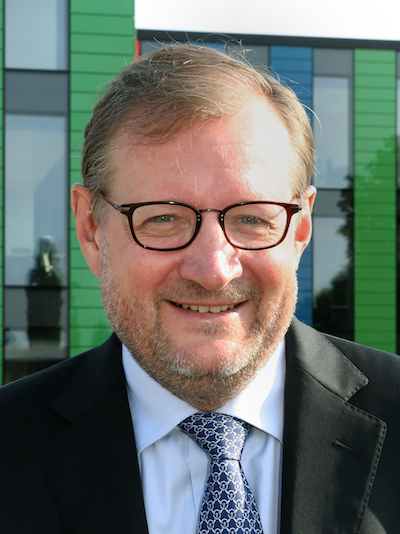Go to
Karl Aberer
Position statement:
Universities and the Digital Revolution
With the advent of mobile communications, social networks and Big Data the world is undergoing the Digital Revolution. This Digital Revolution does not stop at the doors of the universities. On the one hand it calls for the education of new, interdisciplinary profiles with the ability to bridge information technology with application domains. On the other hand – and this is a much more profound change - the Digital Revolution challenges the established practices both in education and research, and will lead to a fundamental transformation of those practices and in consequence of the mission of universities. Massive open online courses (MOOCs), data-driven science and new forms of collaborative research are just first indications of this transformation. For the success of universities it will be crucial to be actors at the forefront in this development.
About the panel member:
 Karl Aberer is a full professor for Distributed Information Systems at EPFL Lausanne, Switzerland, since 2000. His research interests are on decentralization and self-organization in information systems with applications in peer-to-peer search, semantic web, trust management and mobile and sensor networks. Karl Aberer received his Ph.D. in mathematics in 1991 from the ETH Zürich. From 1991 to 1992 he was postdoctoral fellow at the International Computer Science Institute (ICSI) at the University of California, Berkeley. In 1992 he joined the Integrated Publication and Information Systems institute (IPSI) of GMD in Germany, where he was leading the research division Open Adaptive Information Management Systems. From 2005 to 2012 he was the director of the Swiss National Research Center for Mobile Information and Communication Systems (NCCR-MICS, www.mics.ch). Since September 2012 he is Vice-President of EPFL responsible for information systems. He is member of the editorial boards of VLDB Journal, ACM Transaction on Autonomous and Adaptive Systems and World Wide Web Journal. He has also been consulting for the Swiss government in research and science policy as a member of the Swiss Research and Technology Council (SWTR) from 2004 to 2011.
Karl Aberer is a full professor for Distributed Information Systems at EPFL Lausanne, Switzerland, since 2000. His research interests are on decentralization and self-organization in information systems with applications in peer-to-peer search, semantic web, trust management and mobile and sensor networks. Karl Aberer received his Ph.D. in mathematics in 1991 from the ETH Zürich. From 1991 to 1992 he was postdoctoral fellow at the International Computer Science Institute (ICSI) at the University of California, Berkeley. In 1992 he joined the Integrated Publication and Information Systems institute (IPSI) of GMD in Germany, where he was leading the research division Open Adaptive Information Management Systems. From 2005 to 2012 he was the director of the Swiss National Research Center for Mobile Information and Communication Systems (NCCR-MICS, www.mics.ch). Since September 2012 he is Vice-President of EPFL responsible for information systems. He is member of the editorial boards of VLDB Journal, ACM Transaction on Autonomous and Adaptive Systems and World Wide Web Journal. He has also been consulting for the Swiss government in research and science policy as a member of the Swiss Research and Technology Council (SWTR) from 2004 to 2011.
Secondary navigation
- EPFL Workshop on Logic Synthesis and Emerging Technologies
- Luca Amaru
- Luca Benini
- Giovanni De Micheli
- Srini Devadas
- Antun Domic
- Rolf Drechsler
- Pierre-Emmanuel Gaillardon
- Jie-Hong Roland Jiang
- Akash Kumar
- Shahar Kvatinsky
- Yusuf Leblebici
- Shin-ichi Minato
- Alan Mishchenko
- Vijaykrishnan Narayanan
- Ian O'Connor
- Andre Inacio Reis
- Martin Roetteler
- Julien Ryckaert
- Mathias Soeken
- Christof Teuscher
- Zhiru Zhang
- Symposium on Emerging Trends in Computing
- Layout synthesis: A golden DA topic
- EPFL Workshop on Logic Synthesis & Verification
- Luca Amaru
- Luca Benini
- Robert Brayton
- Maciej Ciesielski
- Valentina Ciriani
- Jovanka Ciric-Vujkovic
- Jason Cong
- Jordi Cortadella
- Giovanni De Micheli
- Antun Domic
- Rolf Drechsler
- Henri Fraisse
- Paolo Ienne
- Viktor Kuncak
- Enrico Macii
- Igor Markov
- Steven M. Nowick
- Tsutomu Sasao
- Alena Simalatsar
- Leon Stok
- Dirk Stroobandt
- Tiziano Villa
- Symposium on Emerging Trends in Electronics
- Raul Camposano
- Anantha Chandrakasan
- Jo De Boeck
- Gerhard Fettweis
- Steve Furber
- Philippe Magarshack
- Takayasu Sakurai
- Alberto Sangiovanni-Vincentelli
- Ken Shepard
- VENUE
- Panel on Circuits in Emerging Nanotechnologies
- Panel on Emerging Methods of Computing
- Panel on The Role of Universities in the Emerging ICT World
- Panel on Design Challenges Ahead
- Panel on Alternative Use of Silicon
- Nano-Bio Technologies for Lab-on-Chip
- Functionality-Enhanced Devices Workshop
- More Moore: Designing Ultra-Complex System-on-Chips
- Design Technologies for a New Era
- Nanotechnology for Health
- Secure Systems Design
- Surface Treatments and Biochip Sensors
- Security/Privacy of IMDs
- Nanosystem Design and Variability
- Past Events Archive
